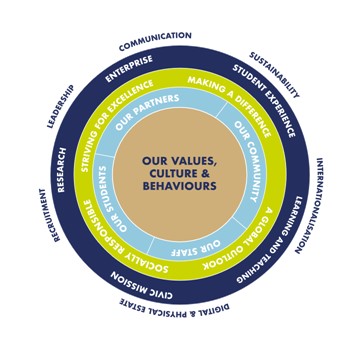1. Swansea University Strategic Vision and Purpose
At Swansea University, we recognise that equipping students with the knowledge and understanding, as well as the skills and attributes, to work in a way that safeguards environmental, social and economic wellbeing is necessary to be able to shape a sustainable future. Swansea University is committed at the highest level to embedding sustainability within teaching, as outlined in the University’s Strategic Vision and Purpose.
Specifically, at the highest strategic level, our University's first commitment is to “align our work to the Sustainable Development Goals”.
Professor Deborah Youngs, was appointed as Pro-Vice Chancellor for education in 2022 and has strategic responsibility for the university’s teaching and learning portfolio to ensure sustainability is embedded into the education.
Swansea University's Strategic Vision and Purpose:

Our Commitments: (page 7)
The climate crisis remains society’s biggest threat. We will align our work to the Sustainable Development Goals and will be a carbon-zero university by 2040.
Socially Responsible: (page 22)
We will work to embed the sustainable development goals across our curriculum, relating teaching to societal challenges. We will increase the proportion of BAME staff members at all levels and will integrate more Black, Asian and Minority Ethnic perspectives into our curriculum to address the attainment gap. We also recognise that learning should be a lifetime endeavour and will expand opportunities for adult learners to acquire new skills and to pursue their intellectual interests.
Our Research: (page 26)
Our research changes lives, drives innovation and regional growth, and is aligned to the UN Sustainable Development Goals. It impacts on our culture and society as well as on our health and wellbeing, our economy and our planet. We drive policy change nationally and internationally. We are at the leading edge in many areas including: advanced manufacturing and innovation in clean energy and the digital economy; nanohealth and the analysis of large scale health data; labour market evaluation, terrorist use of the internet, and preserving our industrial heritage. We are exploring new ways to assess and mitigate the risks of the climate crisis and are working to protect the most vulnerable in our society and to enrich all our lives through our understanding of history and the arts.
Our Research Priorities: (page 29)
We will establish the first Institute for Advanced Studies in Wales, with a particular emphasis on impactful, interdisciplinary and policy-relevant research that addresses Sustainable Development goals.
2. Implementing and Tracking Progress in Education for Sustainable Development
The Sustainability Team has, in the past year, partnered with SOS and Swansea University students to map our SDGS against our curriculum. This has involved mapping taught modules against the UNSDGs, using student auditors. A summary of results is available: 2025 Swansea University Student-Led Sustainability Curriculum Mapping,the final report is due to be available on 8th August 2025.
We also use our external EMS system and a series of internal audit processes, as well as mapping the SDG work across the University, including in teaching and research in all Faculties, as part of the SDG Accord requirement.
Up to date list of Swansea University courses and programmes mapped to Education for Sustainable Development; view: Climate Change and Sustainability Related Courses Programme March 2022
Swansea University Progress in Education for Sustainable Development
Swansea University’s Faculty of Humanities and Social Sciences – School of Management are members of the United Nations: Principles for Responsible Management Education (PRME).
“Working through Six Principles, PRME engages business and management schools to ensure they provide future leaders with the skills needed to balance economic and sustainability goals, while drawing attention to the Sustainable Development Goals (SDGs) and aligning academic institutions with the work of the UN Global Compact.” UN Prime requires members to complete a biennial assessment and report on progress against the 6 principles of Prime which including alignment of curricula and research to the SDG commitments and agenda. Swansea University’s latest performance report. More information about UN Prime and how to take part.
Swansea University ranked 121st in the Global QS Sustainability rankings. The rankings include assessment and benchmarking of Swansea University’s Sustainable education and research, employability and opportunities, environmental and social impact, equality, life quality, impact of education and sustainable institutions.
Swansea University has been participating in THE Impact for SDG rankings since 2022 and is currently ranked 36th globally and 2nd globally for SDG12. The Times Higher Education Impact Rankings are global performance tables that assess participating universities against the United Nations’ Sustainable Development Goals (SDGs). Performance indicators provide comparison across four broad areas: research, stewardship, outreach and teaching. This supports Swansea University with an annual benchmark and framework, to inform progress and strategy against a range of sustainability indicators including Education for Sustainable Development. Swansea University reporting progress against the UN Sustainable Development Goals.
Useful information and links:
Swansea University Climate Action Research Institute
3. Supporting Academic Staff
The University has recently revamped its HEAR recognised Global Citizen Award (GCA). The GCA award now aligns to the UNSDGS and has been based on the UNESCO principles of ESD competencies. The revised format now sees ESD integrated more formally as part of the curricula across faculties and courses. It works directly with academics, researchers and guest lecturers as well as offering volunteering and engagement with the wider Swansea University.
The ESD work consists of standard requirements, but also offers opportunities for specific adaptation and bespoke content depending on the Faculty/course. The most recent example was for the week long course specifically created for the MBA students in the School of Management. View the SOM MBA Award January 2025 timetable.
In addition, an institution wide Carbon Literacy Training programme is now under way for both staff and students. An online e-learning carbon literacy course is now available for all staff and students to complete.
Hear staff talk about their experiences of embedding sustainability into curricula and carbon literacy training.


